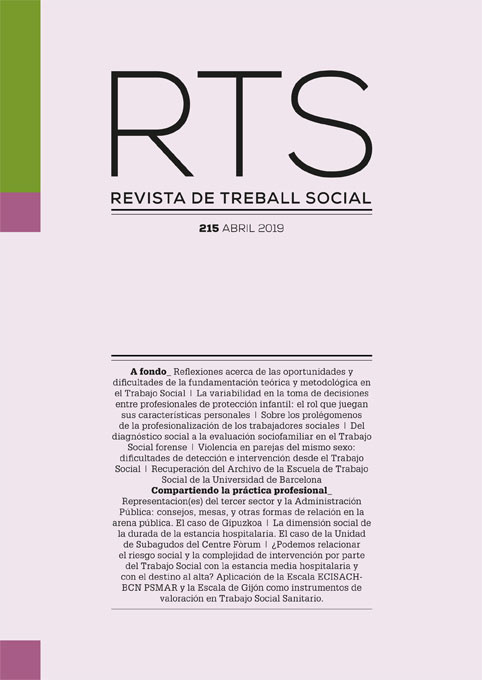The restructuring and responsibility distribution processes to which European welfare systems are being subjected place the third sector in a prominent position. In this respect, the relational and representational procedures established between the third sector and the public administration play an important role in this debate. The Gipuzkoa case, characterised by the approval of a new regulatory framework and the launch of a joint creation process, exemplifies this trend and has established itself as a scenario of reflection for the improvement of the representational procedures and the welfare system as a whole. Based on a participatory methodology founded on qualitative techniques, such as the semi-structured in-depth interview and the discussion group, and in order to examine the potential for creating a round table for civil dialogue in the region, professionals from the public administration and the third sector have been given a voice. This article sets out the key findings of that process, focusing especially on different elements that have led the debate and which concern both the third sector and the public administration in view of the scope for creating a new arena for representation.
Article
Representation(s) of the third sector and public administration. Councils, boards and other forms of relationship in the public arena. The case of Gipuzkoa
Alford, J. (2014). The Multiple Facets of Co-Production: Building on the work of Elinor Ostrom. Public Management Review, 16(3), 299-316. DOI: 10.1080/14719037.2013.806578
Andreotti, A., Mingione, E., i Polizzi, E. (2012). Local welfare systems: A challenge for social cohesion. Urban Studies, 4989, 1925-1940.
Arrieta, F., i Sobremonte, E. (2016). Elementos para un relato de la gober- nanza del Sistema Vasco de Servicios Sociales. Zerbitzuan, 61, 5-20. DOI: 10.5569/1134-7147.61.01
Bano, M. (2018). Partnerships and the Good-Governance Agenda: Impro- ving Service Delivery Through State-NGO Collaborations. Voluntas, 1-14. DOI: 10.1007/s11266-017-9937-y
Bode, I. (2006). Disorganized welfare mixes: Voluntary agencies and new governance regimes in Western Europe. Journal of European Social Policy, 16, 346-359. Doi: 10.1177/0958929706068273
Brandsen, T., i Honingh, M. (2015). Distinguishing Different Types of Co-production: A Conceptual Analysis Based on the Classical De ni- tions. Public Administration Review, 76, 427-435. DOI: 10.1111/puar.12465
Brandsen, T., i Pestoff, V. (2006). Co-production, the third sector and the delivery of public services. Public Management Review, 8(4), 493-501. DOI: 10.1080/14719030601022874
Brandsen, T., i Pape, U. (2015). The Netherlands: The paradox of govern- ment-nonpro t partners. Voluntas, 26, 2267-2282. DOI: 10.1007/s11266-015-9646-3
Brandsen, T., Trommel, W., i Verschuere, B. (2017). The state and the reconstruction of civil society. International Review of Administrative Sciences, 83(4), 676-693. DOI: 10.1177/0020852315592467
Castells, M. (2017). Ruptura. La crisis de la democracia liberal. Madrid: Alianza.
Decret 283/2012, d’11 de desembre, pel qual es constitueix i regula la Mesa del Diàleg Civil. BOPV núm. 248, de 24 de desembre.
Ferrán, A. (2017). Loiolaetxea: Respuesta a la exclusión desde la solidari- dad. Zerbitzuan, 64, 213-226. DOI: 10.5569/1134-7147.64.15
Gimeno, J. (2015). Necesidad y necesidades del tercer sector. Revista Española del Tercer Sector, 38, 49-74.
Izquieta, J. L., Callejo, J. J., i Prieto, J. M. (2008). El tercer sector y las administraciones públicas. Relaciones en el ámbito de la atención social en los niveles regional y local. Revista Internacional de Sociolo- gía, LXVI(49), 115-139.
Jaraiz, G. (2018). El tercer sector de acción social como prestador de servicios. Revista Española del Tercer Sector, 38, 91-112.
Llei 12/2008, de 5 de desembre, de serveis socials. BOPV núm. 246, de 24 de desembre.
Llei 6/2016, de 12 de maig, del tercer sector social d’Euskadi. BOE núm. 151, de 23 de juny.
Lu, J., i Xu, C. (2018). Complementary or supplementary? The relations- hip between government size and nonpro t sector size. Voluntas, 1-16. DOI: 10.1007/s11266-018-9981-2
Martínez-Buján, R. (2014). Los modelos territoriales de organización so- cial del cuidado a personas mayores en los hogares. Revista Española de Investigaciones Sociológicas, 145, 99-126.
Milbourne, L. (2009). Remodelling the third sector: Advancing collabora- tion or competition in community-based initiatives? Journal of Social Policy, 38(2), 277-297. doi: 10.1017/S0047279408002845
Osborne, S. P., Radnor, Z., i Strokosch, K. (2016). Co-Production and the Co-Creation of Value in Public Services: A suitable case for treat- ment? Public Management Review,
Ranci, C. (2015). The Long-Term Evolution of the Government – Third Sector Partnership in Italy: Old Wine in a New Bottle ? Voluntas, 26, 2311-2329. DOI: 10.1007/s11266-015-9650-7
Rodríguez, G. (2015). Avances, limitaciones y retos del tercer sector de acción social en España. Revista Española del Tercer Sector, 38, 75-97.
Salamon, L. M. (2015). Introduction: The nonpro tization of the welfare state. Voluntas, 26, 2147-2154. DOI: 10.1007/s11266-015-9638-3
Salamon, L. M., i Toepler, S. (2015). Government-nonpro t cooperation: Anomaly or necessity? Voluntas, 26, 2155-2177. DOI: 10.1007/s11266-015-9651
Salgado, A. (2007). Investigación cualitativa: Diseños, evaluación del rigor metodológico y retos. Liberabit, 13, 71-78.
Susías, C. (2018). Estrategias para la sostenibilidad (institucional, organizativa, económica) del tercer sector de acción social. Revista Española del Tercer Sector, 38, 113-134.
Taylor, M., i Bassi, A. (1998). Unpacking the State: The implications for the third sector of changing relationships between national and local government. Voluntas, 9(2), 113-136.
Taylor, S., i Bodgan, R. (1990). Introducción a los métodos cualitativos de investigación. Barcelona: Paidós.
Voorberg, W. H., Bekkers, V. J. J. M., i Tummers, L. G. (2015). A Systema- tic Review of Co-Creation and Co-Production: Embarking on the soci- al innovation journey. Public Management Review, 17(9), 1333-1357. DOI: 10.1080/14719037.2014.930505
Zubero, I. (2018). El tercer sector como movimiento voluntariadista: Una propuesta para repensar la identidad del TSA desde el paradigma de la democracia del ciudadano. Revista Española del Tercer Sector, 38, 43-68.





